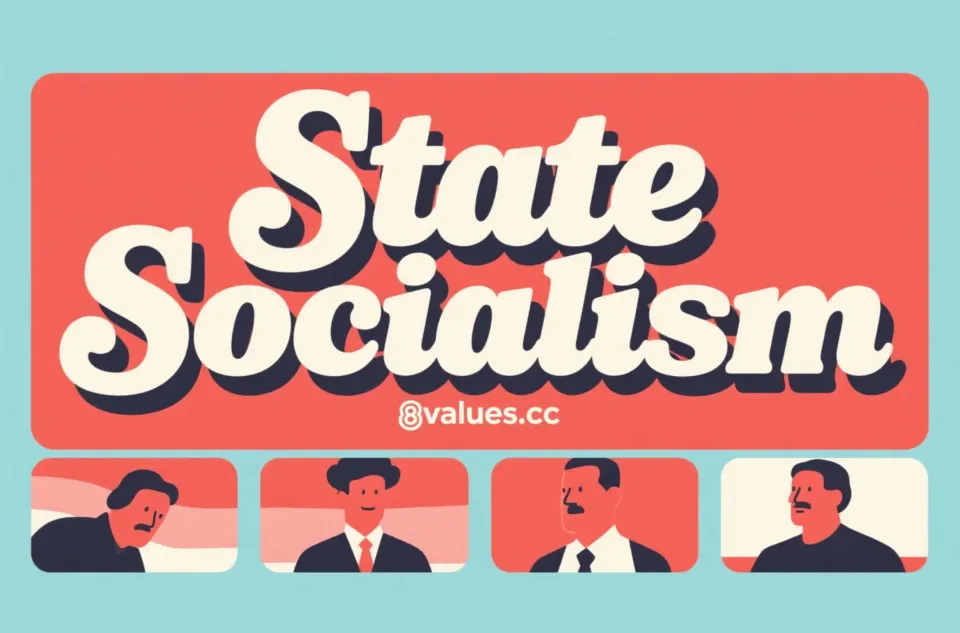Social Democracy and Democratic Socialism: Comparison of Ideological Differences
Explore the core differences between social democracy and democratic socialism. Understand the differences between these two political ideologies in economic systems, capitalist views and methods of change. Discover your values through our political inclination tests.
Have you ever been confused by the terms “social democracy” and “democratic socialism”? They are often mentioned, especially when discussing left-wing political ideas, but their core meanings and goals actually differ significantly. While both emphasize democracy, equality and public welfare, working to reduce inequality, expand social security programs, and increase government participation in the economy, they are fundamentally different in how these goals and attitudes toward capitalism. This article will dig into these two ideologies to help you understand the boundaries between them clearly. Want to know your own political inclinations? Please visit our Political Prone Test .
Understand what social democracy is
Social democracy is a political ideology designed to reform and “humanize” capitalism through strong government intervention. It accepts a market economy, but believes that the market needs to be restricted through means such as taxation, trade unions and wealth redistribution. Social democrats support the creation of a hybrid economy while maintaining private businesses and mitigating inequality through public welfare.
The core concepts of social democracy include:
- Economic System: A hybrid economy, private enterprises coexist with strong government regulation and public welfare.
- Capitalism: Accept and commit to reforming capitalism, believing that it can be made fairer through rules, regulations and safety nets.
- Methods of change: Reformism, achieve goals through gradual policy changes within the existing democratic system.
- Welfare and Equality: A strong emphasis is placed on universal social welfare (such as health care and education) and is funded by a progressive tax system.
Historical social democracy emerged in the late 19th and early 20th centuries and was a pragmatic branch of socialism, advocating "evolution" rather than revolutionary change. Nordic countries such as Sweden and Norway are classic examples of social democracy, with high taxation, sound social security networks while the private sector is still thriving.
Understand what democratic socialism is
Democratic socialism is a further political belief that aims to transcend capitalism by establishing social ownership of means of production. It believes that capitalism is exploitative in nature and seeks to gradually transition from private ownership to collective control. The goal of democratic socialism is to establish a socialist economy, replace private profit-oriented production through public or worker ownership, and achieve democratic control.
Key features of democratic socialism include:
- Economic system: a socialist economy, where key industries are owned by society (public or workers); the goal is to replace private profit-driven production with democratic control.
- Capitalism: Reject capitalism; seek to gradually get rid of private ownership and achieve collective control.
- Methods of Change: Also reformism (through democratic means), but more transformative, viewing reform as a step toward broader systematic change.
- Welfare and Equality: On the basis of universal welfare, further expand to workplace self-management and economic democracy.
Democratic socialism is rooted in the Marxist tradition, but it firmly opposes authoritarianism. It emphasizes the realization of socialism through democratic elections and participation. For example, public banks, cooperatives and state-owned utilities are seen as steps towards full socialism. Some American politicians, such as Bernie Sanders and Alexander Ocasio-Cortez, are often regarded as representatives of democratic socialism.
The core difference between social democracy and democratic socialism
Although both social democracy and democratic socialism work to reduce inequality and protect workers’ rights, they differ significantly in the ways in which they achieve change and their perceptions of the functioning of the economy.
| aspect | Social Democracy | Democratic Socialism |
|---|---|---|
| Economic System | Mixed Economy: Capitalism coexist with emphasis on regulation, private enterprises and public welfare | Socialist economy: Key industries are owned by society (public or workers); the goal is democratic control |
| Capitalism concept | Accept and reform capitalism; think that the market is necessary, but requires restraint | Reject capitalism; seeking a gradual transition to collective control |
| Methods of change | Reformism: Achieving goals through gradual policies within existing democratic systems | Changeism: Viewing reform as a step toward broader systematic change |
| Main objectives | Reform existing systems to better serve everyone | Renovate existing systems and give ordinary people more power over their lives and their economy |
Why is it easy to be confused?
The reason these two terms are easily confused is partly because many social democrats may also call themselves democratic socialists and vice versa, especially in certain countries or regions, such as the United States, where historical reasons lead to the word "socialism" with a specific meaning. In Europe, these labels diverged more over time, with post-World War II welfare states dominated by social democracy. Both reject revolution and instead support the achievement of their goals through votes, but democratic socialism usually moves to a more left-handed direction, believing that social democracy is a necessary but insufficient step.
Common values
Despite the differences in strategy and objectives, social democrats and democratic socialists share some core values:
- Pursuing greater economic equality.
- Support universal health care and education rights.
- Defend civil liberties and democratic systems.
Ultimately, the debate between the two boils down to: Should we reform the existing system, or completely reshape it?
Explore your political ideology
Understanding the nuances of these political ideologies will help you have a clearer understanding of the full picture of left-wing political thought. Whether you tend to reform capitalism or want to transcend and reshape it, the most important thing is your personal values and beliefs.
8values.cc provides free political inclination tests to help you explore your political stance and understand the dimensions of your values in which these ideologies are consistent. By completing the test, you can better understand your political views and find your place in the broader political spectrum. We encourage you to click here to participate in the test and continue to visit our official blog and ideological list to learn more about political thought.






